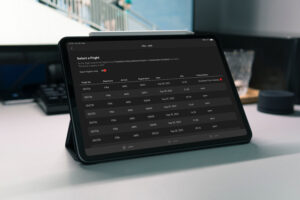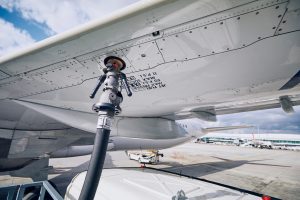Airlines — A (former) Forerunner When it Comes to Standards and Digital Transformation
The first companies that come into your mind when you think about innovations and digital disruptions are Apple, Facebook, or some fresh Silicon Valley startups. However, there was a time when airlines were part of the innovative global think tank!
More precisely, it was the airline industry that accomplished one of the biggest digitalization projects even long before the whole world started talking about the digital revolution.
Don’t believe me? Well, do you remember the time of paper-based tickets? Depending on your age, you probably don’t.
Airlines accomplished one of the world’s biggest digitalisation projects long before the world started talking about the digital revolution.
The elimination of paper-based tickets has been one of the most significant initiatives the International Air Transport Association (IATA) ever executed. Already in the early 2000s, a global program was initiated to get rid of paper in the reservation process. Besides sustainability, the initiative aimed to drive efficiency and reduce process costs.
And more importantly, the initiative was based on a global “e-Ticket standard.” That standard ensures airlines, travel agencies, and all other stakeholders can seamlessly communicate and exchange ticket information.
The Results of the e-Ticket Initiative
In 2007, IATA announced that 97% of all tickets are now issued electronically. A huge success that helped to save 50,000 trees annually since then. Today, almost 100% of airlines worldwide rely on e-Tickets, making e-Tickets a worldwide standard. I would even go that far and say that it is impossible to run an airline without e-Tickets.
Corona is Driving the Need for Further Digitalization.
The ongoing pandemic has painfully shown that airlines urgently need to digitize their processes further. The reasons are pretty much the same as for e-Tickets in the early 2000s: Cost reduction, efficiency improvement, and process optimization.
However, we must distinguish two types of digitalization initiatives. On the one hand side, there are specific digital projects. These are the projects every airline is doing on its own — especially to achieve competitive advantages. On the other side, there are areas where airlines have to cooperate to achieve the most significant benefits.
e-Fueling: A Future Standard Airlines Have to Evaluate now!
One of the latter is about Electronic Fueling (e-Fueling). Electronic Fueling is an initiative that is comparable to e-Tickets. With Electronic Fueling, airlines aim to digitize the operational fueling process. First and foremost, this contains the entire communication between airlines and fuel providers or into-plane agents.
Moreover, and again similar to e-Tickets, the initiative aims to ban papers from the process — namely, fuel slips, receipts, fuel orders, etc.
The envisioned results are similar to e-Tickets: More efficient processes, cost savings, and sustainability effects.
Electronic Fueling is Poised to Become an Industry Standard for all Airlines
Due to the immense number of stakeholders (fuel providers, into-plane agents, etc.) that differ from airport to airport, Electronic Fueling (e-Fueling) definitely is one of the industry-wide initiatives where all airlines have to cooperate.
Thankfully, the International Air Transport Association has set necessary standards and passed the AIDX message standard. This message standard serves as the fundament for all fueling-related communication and builds a significant cornerstone of the e-Fueling initiative.
Due to the immense advantages, an increasing number of airlines and fuel providers are currently adapting the e-Fueling standard and digitize their fueling process.
e-Fueling: Airline Standard in 2025?
Although IATA hasn’t announced a deadline when all airlines should have switched to an electronic fueling process, Corona has accelerated the initiative massively. Since we witness many airlines switching to the electronic process at the moment, we assume e-Fueling to become standard latest in 2025.
Standard in this context means that manual Fueling will still be possible but the exception. Subsequently, airlines that still rely on manual processes will have to pay higher fees.
And I would go even one step further: In 10 years from now, a paper-based and manual fueling process will look as awkward as paper tickets look today!





